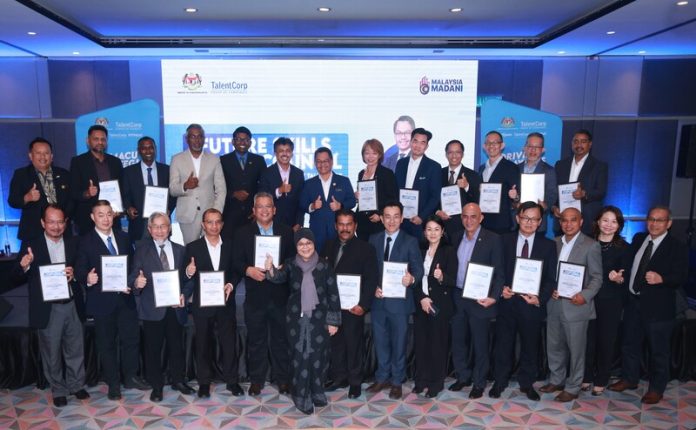
Taking a significant step to address talent challenges and strengthen the Malaysian talent ecosystem, Talent Corporation Malaysia Berhad or TalentCorp officially introduced the Future Skills Talent Council (FSTC), an industry-driven approach initiative to ensure that Malaysian talents are skilled for jobs of the future.
Through the FSTC, industry leaders will play a key role in identifying the skills needed for the evolving demands of their respective sectors and driving the necessary training so talents’ skills are upgraded based on current and future needs.
TalentCorp’s role in driving and facilitating the FSTC will be on a public-private partnership basis, where the agency will bring in strategic collaborators such as the Department of Skills Development (JPK), Manpower Department (JTM), National Institute for Occupational Safety and Health (NIOSH), and Skills Development Fund Corporation (PTPK).
During the launch event, Datuk Ts. Mustapha Sakmud, Deputy Minister of Human Resources highlighted the importance of a skilled workforce that is resilient, creative, and adaptable to meet future needs.
“The Future Skills Talent Council by TalentCorp will be key in driving solutions for Malaysia’s talent challenges, especially underemployment or talent mismatch. The main drivers will be industry players who are equally invested in having a workforce that is competitive and productive,” he said.
“This will especially benefit our Technical and Vocational Education and Training (TVET) workforce and raise wages for talents to enjoy a better standard of living,” he added.
Countries like Singapore, India, New Zealand, Australia, and the Philippines have embraced sector-based skills approaches to bolster their workforce capabilities and cater to the specific needs of different industries.
Concurrently, the International Labour Organisation (ILO) actively supports the formation of sector skills bodies to bring together skill supply and demand, and to promote effective governance through coordinated efforts.
TalentCorp’s pilot FSTC is for the electrical and electronics (E&E) sector to support the Twelfth Malaysia Plan and the New Industrial Master Plan 2030.
Subsequently, the agency aims to increase the councils to encompass more sectors, the next FSTC being for the ICT sector, to create a skilled and competent workforce and positively impact the country’s economy.
Thomas Mathew, TalentCorp’s Group CEO called the initiative timely in line with Malaysia’s aspirations to attain high-income nation status and fulfill the MADANI Economy goals.
“Malaysia has a young talent source that can potentially meet investors’ needs. Through the FSTC, the industry will be able to mold these emerging talents and equip them with skills to drive their businesses,” he said.
Thomas also stated, “TalentCorp will put in the resources of our other initiatives, such as the Critical Occupations List, the National Skills Registry, mynext, Young Employable Students, and YES! Rock the School, to fully support the various councils that will be established later.”
“With this, we hope to contribute to a comprehensive, integrated, and coordinated strategy for skills development, as well as to promote collaboration between government, industry, and academia, for a productive workforce that is ready for the future,” he continued.


















